
Psalm 1:1-6
1 How blessed is the man who does not walk in the counsel of the wicked, nor stand in the path of sinners, nor sit in the seat of scoffers!
2 But his delight is in the law of the LORD, sick and in His law he meditates day and night.
3 He will be like a tree firmly planted by streams of water, which yields its fruit in its season and its leaf does not wither; and in whatever he does, he prospers.
4 The wicked are not so, But they are like chaff which the wind drives away.
5 Therefore the wicked will not stand in the judgment, nor sinners in the assembly of the righteous.
6 For the LORD knows the way of the righteous, but the way of the wicked will perish.
We have all heard a preacher use Psalm 1 to say “Be like the blessed man who delights in the law of the LORD and not like the wicked who will perish.” Yet, when we actually examine the text, it is interesting to note that there is no prescriptive language whatsoever. Read the Psalm through again and you will discover that the text does not actually tell us to DO anything. There are no imperatives, no commands. Psalm 1 is entirely descriptive language.
Eric Costa is quite right when he asks, “What is being described here in Psalm 1? The life of those called “righteous” in contrast with those called “wicked.” What is the main difference between the righteous and the wicked? Is it the object of their delight? Is it the fruit of their labors? Is it the eternal destiny of their souls? No, the first thing that makes the righteous differ from the wicked is that the righteous are “blessed.” The starting point of the “way of the righteous” is the blessing of God.”
As in the opening of the Sermon on the Mount, the book of Psalms opens with a blessing.
Blessed means supremely happy or fulfilled – Dr. James Montgomery Boice states that the Hebrew word for blessed here is actually plural, which “denotes either a multiplicity of blessings or an intensification of them. The verse might be correctly translated, “O the blessednesses of the man who does not walk in the counsel of the wicked.”
The blessed man does not do certain things (negative) (v. 1) but takes his delight in God’s word (positive) (v. 2).
1) He does not walk in the counsel of the ungodly – he receives wiser counsel.
2) He does not stand in the path of sinners. His company is more select – he does not fellowship with evil (2 Cor. 6:14).
3) He does not sit in the seat of the scornful – he does not listen to the scoffing and mockery of others
Positively, his delight is in the law of the Lord. This is what he thinks about. His mind is focused on scripture, day and night.
John Stott – this delight “is an indication of the new birth for ‘… the sinful mind is hostile to God. It does not submit to God’s law, nor can it do so’ (Rom. 8:7). As a result of the inward, regenerating work of the Holy Spirit, however, the godly find that they love the law of God simply because it conveys to them the will of their God. They do not rebel against its exacting demands; their whole being approves and endorses it… Delighting in it, the godly will meditate in it, or pore over it, constantly, day and night.”
This Psalm contrasts those who are in love with sin and those who love God.
The law of the Lord, in David’s time, only referred to a few books, but now encompasses the entirety of the 66 book canon of the Bible. (2 Tim 3:16, 17)
v. 3 – This blessed man is likened to a tree planted – A tree does not plant itself. Someone else does the planting. It is the Father who plants….
Matthew 15:12 Then the disciples came and said to Him, “Do You know that the Pharisees were offended when they heard this statement?” 13 But He answered and said, “Every plant which My heavenly Father did not plant shall be uprooted.” Continue reading →
 “When the day of Pentecost arrived, they were all together in one place. And suddenly there came from heaven a sound like a mighty rushing wind, and it filled the entire house where they were sitting. And divided tongues as of fire appeared to them and rested on each one of them. And they were all filled with the Holy Spirit and began to speak in other tongues as the Spirit gave them utterance.” – Acts 2:1-4
“When the day of Pentecost arrived, they were all together in one place. And suddenly there came from heaven a sound like a mighty rushing wind, and it filled the entire house where they were sitting. And divided tongues as of fire appeared to them and rested on each one of them. And they were all filled with the Holy Spirit and began to speak in other tongues as the Spirit gave them utterance.” – Acts 2:1-4

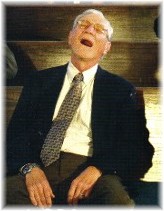
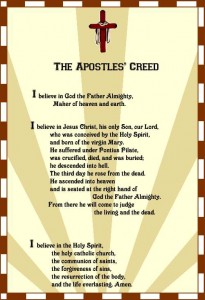
 There are a couple of complicating factors. The first is how we use the English word, ‘hell’ to translate various Hebrew and Greek words. The second is the history and meaning of the phrase in the Apostles’ Creed, “he descended into hell”. Let me now try and unpack these issues in turn.
There are a couple of complicating factors. The first is how we use the English word, ‘hell’ to translate various Hebrew and Greek words. The second is the history and meaning of the phrase in the Apostles’ Creed, “he descended into hell”. Let me now try and unpack these issues in turn.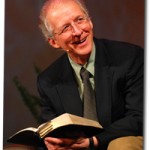 Dr. John Piper:
Dr. John Piper: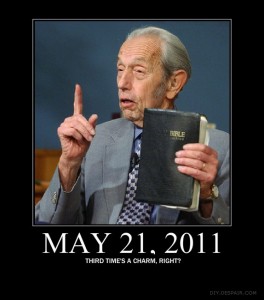
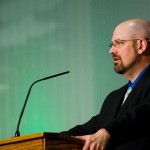 Well, are you ready? Even those living in a pretty sheltered world are starting to hear about May 21 now. The date is met with chuckles and smiles by most. Another end times prophet, more reason to question those nutty Christians. Atheists are planning Rapture Parties. Documentaries will be made about what happens on May 22nd. Disappointed followers will be looked at closely. Concerns, quite valid concerns, exist about some choosing to depart this world forcibly should they live to see May 22nd. Some of Camping’s callers have been calling to ask about euthanizing their pets before May 21, and an atheist group has set up a pet rescue program where, for only $135, they will come get your dog or cat after you are raptured (the offer is good for ten years!).
Well, are you ready? Even those living in a pretty sheltered world are starting to hear about May 21 now. The date is met with chuckles and smiles by most. Another end times prophet, more reason to question those nutty Christians. Atheists are planning Rapture Parties. Documentaries will be made about what happens on May 22nd. Disappointed followers will be looked at closely. Concerns, quite valid concerns, exist about some choosing to depart this world forcibly should they live to see May 22nd. Some of Camping’s callers have been calling to ask about euthanizing their pets before May 21, and an atheist group has set up a pet rescue program where, for only $135, they will come get your dog or cat after you are raptured (the offer is good for ten years!).  “Whoever believes in the Son has eternal life; whoever does not obey the Son shall not see life, but the wrath of God remains on him.” – John 3:36
“Whoever believes in the Son has eternal life; whoever does not obey the Son shall not see life, but the wrath of God remains on him.” – John 3:36 I don’t always find myself in agreement with Roger Olson (he calls himself “a proud Arminian” and I am seeking to be neither of these), but regarding what he writes below, I could not agree with him more. It underlined to me just how far from the Bible the modern day visible Church has strayed. Millions of people are just lapping this stuff up as “gospel” truth, never thinking for even a moment about the danger this perversion is to their souls.
I don’t always find myself in agreement with Roger Olson (he calls himself “a proud Arminian” and I am seeking to be neither of these), but regarding what he writes below, I could not agree with him more. It underlined to me just how far from the Bible the modern day visible Church has strayed. Millions of people are just lapping this stuff up as “gospel” truth, never thinking for even a moment about the danger this perversion is to their souls. (1) Michael Brown joins James White to discuss his (Brown’s) new book, “A Queer Thing Happened to America.” This is one of the most important cultural issues of our day, and we dare not ignore it.
(1) Michael Brown joins James White to discuss his (Brown’s) new book, “A Queer Thing Happened to America.” This is one of the most important cultural issues of our day, and we dare not ignore it. 